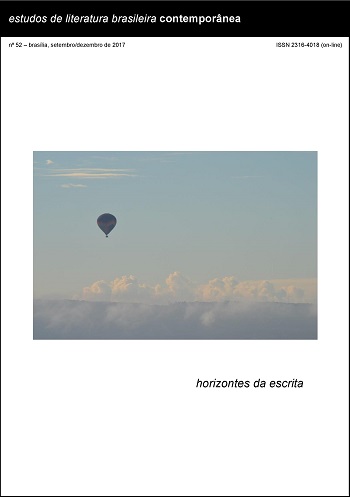Leilah Assumpção, the wall and the neutral day
DOI:
https://doi.org/10.1590/2316-40185211Keywords:
Letras, Literatura, TeatroAbstract
Leilah Assumpção’s plays have not received neither the critical nor the editorial attention they merit, this lack of attention is the result of an environment dominated by misogyny and by power structures that construe dramaturgy and writing as typically male activities. Being part of a new dramaturgy, which flourished in the seventies, the playwright draws a path where relationships emerge as the search for women’s visibility, the visibility of their personal, sexual and professional desires and, therefore, the questioning of traditional male roles. This article analyses Assumpção’s work, showing how through an ironic and unexpectedly humorous depiction of highly conflicted situations she presents the subject’s journey towards their selves and their places in the world.
Downloads
References
ANDRADE, Ana Lúcia Vieira de (2006). Margem e centro. São Paulo: Perspectiva.
ANDRADE, Ana Lúcia Vieira de; EDELWEISS, Ana Maria de Bulhões Carvalho (Org.) (2008). A mulher e o teatro brasileiro do século XX. São Paulo: Hucitec.
ARAÚJO, Laura Castro de (2007). A dramaturgia de autoria feminina. In: SEMINÁRIO NACIONAL MULHER E LITERATURA, 12.; e SEMINÁRIO INTERNACIONAL MULHER E LITERATURA, 3., 9-11 out. 2007, Uesc, Ilhéus. Anais… Ilhéus: Uesc.
ASSUMPÇÃO, Leilah (2010). Onze peças de Leilah Assumpção. Rio de Janeiro: Casa da Palavra.
BAUMAN, Zygmunt (2005). Identidade. Entrevista a Benedetto Vecchi. Tradução de Carlos Alberto Medeiros. Rio de Janeiro: Zahar. E-book.
CARPEAUX, Otto Maria (2011). História da literatura ocidental. São Paulo: Leya. E-book.
CLARO, Priscilla (2015). Uma leitura crítica de Fala baixo, senão eu grito, de Leilah Assumpção. Dissertação (Mestrado em Literatura Brasileira) ”“ Universidade de São Paulo, São Paulo.
MAGALDI, Sábato (2004). Panorama do teatro brasileiro. São Paulo: Global, 2004.
MAGALDI, Sábato (2008). O texto no teatro. São Paulo: Perspectiva, 2008.
MAGALDI, Sábato (2015). Amor ao teatro. Pesquisa, seleção e organização Edla Van Steen. São Paulo: Sesc. E-book.
MATE, Alexandre; SCHWARCZ, Pedro M. (Org.) (2012). Antologia do teatro brasileiro. Rio de Janeiro: Cia das Letras.
PATRIOTA, Rosangela; GUINSBURG, Jacó (2012). Teatro brasileiro: ideias de uma história. São Paulo: Perspectiva.
PELLEGRINI, Sandra (2007). A representação dos papéis e da sexualidade feminina no teatro brasileiro durante o período da ditadura militar. Diálogos, Costa Rica, v. 8, n. 1, p. 270-289, febr./sept.
PONTES, Heloísa (2013). Mariazinha e Verônica: classe e gênero nos palcos da metrópole. Novos Estudos ”“ Cebrap, São Paulo, n. 97, p. 149-166, nov.
PRADO, Décio Almeida (2009). O teatro brasileiro moderno. São Paulo: Perspectiva.
PRIORE, Mary Del (2012). História do amor no Brasil. São Paulo: Contexto. E-book.
PUJAL, Margot (2015). El feminismo como teoría. Barcelona: UOC. E-book.
ROMANO, Lúcia Regina Vieira (2009). De quem é esse corpo? ”“ A performatividade do feminino no teatro contemporâneo. Tese (Doutorado em Teoria e Prática do Teatro) ”“ Universidade de São Paulo, São Paulo.
ROSENFELD, Anatol (2014). Teatro em crise. São Paulo: Perspectiva.
TRIGUEROS, Maria Tereza Alario (2008). Arte y feminismo. San Sebastian: Nerea. E-book.
VINCENZO, Elza Maria de (1992). Um teatro da mulher. São Paulo: Perspectiva.
Downloads
Published
How to Cite
Issue
Section
License
Authors who publish in this journal agree to the following terms:
a) The authors maintain the copyright and grant the journal the right of first publication, the work being simultaneously licensed under the Creative Commons Attribution License-Non Commercial 4.0 which allows the sharing of the work with acknowledgment of the authorship of the work and publication this journal.
b) Authors are authorized to enter into additional contracts separately, for non-exclusive distribution of the version of the work published in this journal (eg publish in institutional repository or as a book chapter), with authorship recognition and publication in this journal.
c) Authors are allowed and encouraged to publish and distribute their work online (eg in institutional repositories or on their personal page) after the editorial process, as this can generate productive changes, as well as increase the impact and citation of published work (See The Effect of Free Access).
d) The authors of the approved works authorize the magazine to, after publication, transfer its content for reproduction in content crawlers, virtual libraries and the like.
e) The authors assume that the texts submitted to the publication are of their original creation, being fully responsible for their content in the event of possible opposition by third parties.


